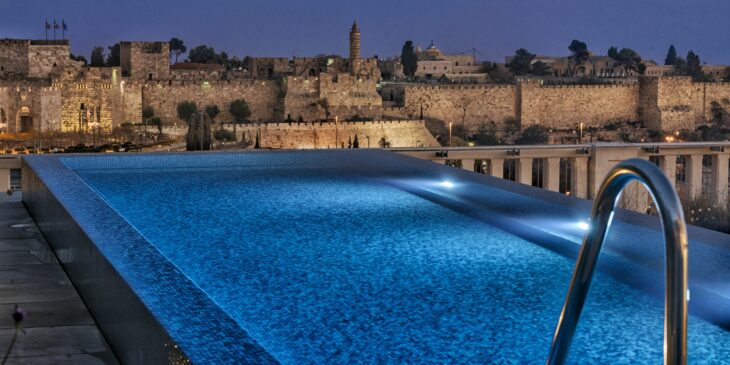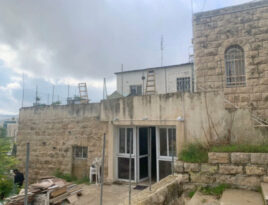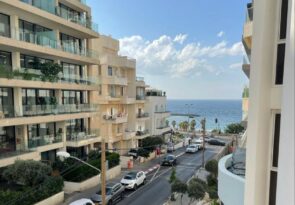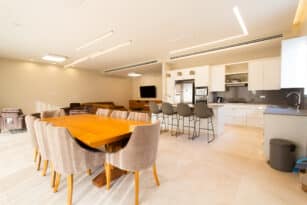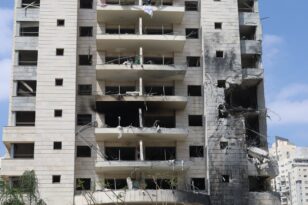Once reserved for the very wealthy, private pools in Israel have become much more accessible in recent years. The trend received a major boost during the COVID-19 pandemic, and since then, demand has grown among parents and grandparents who’ve found a clever way to attract their kids and grandkids to visit more often. For those with smaller yards, there are even “retractable” pool options. As the sweltering summer season approaches—here’s everything you need to know about the trend that’s keeping people cool.
By Hadas Magen, Nadlan Center
Oren and Anat Amiran from Lapid have three grown children and a growing crew of grandchildren. A few years ago, their above-ground pool finally gave out. After 20 faithful years of use, it suddenly burst one day. Since their kids were already grown and moving out, the loss didn’t feel too significant, and the couple got used to having a backyard without a pool. That is, until the kids spoke up—they really wanted a pool again, but this time, a proper in-ground one.
“They talked about it like fulfilling a dream,” says Anat. “I had my doubts, mainly because of the cost, but the idea that it would increase the home’s value—and the feeling that we were making a dream come true—convinced me to go for it.” “Financially,” Oren adds, “when you sell a house with a newly built pool, the pool can add double its cost to the property value. That wasn’t our motivation, but in theory, it’s a good deal.”
So they went all in: an infinity pool where the water level is flush with the surrounding tiles—an upgrade that comes with a higher price tag—and a counter-current swimming system. The process wasn’t smooth, mostly due to permitting hurdles and contractor delays at the start of the war. But about six months ago, on Oren’s 60th birthday, they officially inaugurated their 10-by-4-meter pool, built in the front yard of their home.
Looking back, despite spending hundreds of thousands of shekels including landscaping, they have no regrets and feel the pool has transformed their lives. “It’s a completely different experience from what we had before,” they say. “A built-in pool is far more inviting than any other type. It feels like the real thing. It brings a sense of freedom and indulgence to everyday life—it’s like living the dream. Even now, when it’s too cold to swim, we sit by the pool with our morning coffee. It was worth every challenge we faced along the way.”
“There are more parties, all kinds of gatherings at all hours—it’s really become a magnet for everyone,” Anat says again. “I never imagined I’d be this happy with it. The pool makes hosting so easy because the main attraction is already there. I also love that the family wants to come over even when we’re not home, just to enjoy the pool. The best part is the feeling of everyday freedom and luxury.”
The biggest bonus, of course, is that ever since the pool was added, the kids jump at every chance to visit. “There are more parties, all kinds of gatherings at all hours—it’s really become a magnet for everyone,” Anat says again. “I never imagined I’d be this happy with it. The pool makes hosting so easy because the main attraction is already there. I also love that the family wants to come over even when we’re not home, just to enjoy the pool. The best part is the feeling of everyday freedom and luxury.”
As for maintenance, Oren says it doesn’t take much effort—he handles it himself, cleaning the filters and checking the salt levels. All in all, they say, “it’s pure pleasure that has significantly upgraded our lives at home.”
No Longer Just in Savyon and Kfar Shmaryahu
A private backyard pool in Israel was considered a status symbol until about 20 years ago—but it’s no longer something you only see in elite neighborhoods like Savyon or Kfar Shmaryahu. We’re not talking about Intex pools you can pick up at a sporting goods store for a few thousand shekels—we’re talking about built-in concrete pools. And more and more families, especially those living in private homes, are jumping on the trend.
According to Avner Tzadok, owner of Pelegim, a company that designs and installs private pools in Israel, the surge in demand began during the COVID-19 era and continued through the war. “People realized they were staying home and wanted the family to gather around the house,” he says. Architect Boaz Snir agrees, noting that the major shift happened during COVID: “People were home all the time, the kids were home too, and no one was traveling.”
“The big boom was during COVID,” says Dovi Rosenberg, a professional pool maintenance technician. “People weren’t going anywhere and had extra disposable income. There’s definitely more interest in private pools in Israel now. There are WhatsApp groups and entire businesses that have popped up toe meet the growing demand.”
It often started with Intex pools, which many people bought during that time. But once they got a taste of having a private pool, they wanted more. “After experiencing those pools, they got tired of them and started wanting the real deal,” says Snir. “Today, you see private pools in Israel, even in small yards. If the old mindset was that you needed a big yard to justify a pool, now people are saying—it’s better to have a small permanent pool than an inflatable one.”
Initial Construction and Ongoing Maintenance Costs
The most basic and budget-friendly private pools in Israel are still the Intex-style ones, which cost just a few thousand shekels. Next up are fiberglass and modular pools. “In a modular pool, the frame is made of metal or plastic and covered in PVC,” Rosenberg explains. “The floor is a layer of concrete, also coated with PVC.” Thanks to this technology, they look just like “the real thing” and typically cost between 100,000–150,000 shekels, with construction costs in a similar range.
At the top of the pyramid are built-in concrete pools. These typically start at 250,000–300,000 shekels, not including permits, which can add another 150,000 shekels. “Building a pool is a major project,” says Tzadok from Pelegim. “You need a permit, an architect—it takes a lot of energy, time, and money. Even with the simpler modular options available, those who can afford it usually go for a concrete pool.” The most popular size: 4 by 10 meters.
The ideal time to build an in-ground private pool in Israel is during the initial construction of the home or as part of a major renovation that already requires a permit, which helps lower the relative cost. Beyond the construction itself, ongoing monthly expenses include electricity, water, and possibly hiring a pool technician—though some homeowners choose to manage the upkeep themselves. Rosenberg estimates these monthly costs at around 1,000 shekels.
Israel—A Leader in Private Pools
One drawback, especially on half-dunam lots with limited outdoor space, is that the entire yard often ends up being “dedicated” to the pool. For those torn between having a yard or a pool, there’s a solution: a retractable pool cover. With the push of a button, a hydraulic mechanism covers the pool, instantly turning it back into usable space.
That kind of flexibility doesn’t come cheap. Yair Bar Lev, Marketing Director at Agor Engineering, which provides hydraulic pool floors, says this luxury runs around 300,000–400,000 shekels. “For a 20-square-meter pool, at about 20,000 shekels per meter, you essentially get your real estate back—when the hydraulic system is activated, the pool becomes a patio,” he explains. Ironically, those who can afford such a system usually already have a yard big enough for both a pool and a garden. Still, Agor’s system is no lightweight—it can support up to 250 kg per square meter, meaning a 20-meter surface can hold up to 5 tons.
Bar Lev notes that 15 years ago, most private pools in Israel were massive—sometimes half-Olympic in size. Today, even pools as small as 12–15 square meters are common. “The point is simply to have a pool,” he says. He also points out that Israel is a global leader when it comes to the number of private pools and the adoption of hydraulic systems, rivaled only by France—especially its southern region.
Private Pools: The Ultimate “Grandkid Magnet”
As the Amirans’ story shows, private pools in Israel have become a powerful magnet for adult children and grandchildren. A new demographic is emerging in the pool scene: people in their 60s building pools specifically to encourage family visits. “There’s even a nickname for it—grandkid hunters,” jokes Rosenberg. “People know that if they have a pool, they won’t need to beg their grandkids to visit—it’ll just happen naturally.” Tzadok adds, “People are willing to invest because they want to bring the family closer. I have many older clients whose kids came back from backpacking trips, and now they’re building pools to keep them coming back.”
“It’s definitely a grandkid trap,” admits Rimona Leibowitz, who along with her husband Yair, built a pool during a renovation of their Modi’in home a few years ago. They have four grown children who no longer live at home and one grandchild. The kids often come to use the pool—sometimes alone, sometimes with friends—and so does the grandchild. Leibowitz recalls that before adding the pool during their renovation, they hesitated. Their main concerns were safet, high costs, and losing yard space. Beyond that, she says, “Maintaining a private pool in Israel is a hassle: construction costs hundreds of thousands of shekels, the pump has to run constantly, you don’t drain the water, and you need a technician. Things break.”
For example, their pool’s pump room flooded twice due to rain. Looking back, she says, “It’s not clear that it’s worth all the hassle, but I also wouldn’t give it up—it’s really fun. Still, it’s a lot to manage. Just one more thing in the house to take care of.” Rosenberg is all too familiar with that sentiment. He has clients who just want to fill in their pools with sand. “It’s a burden and it’s costly,” he says. “You only build a pool once—and if it’s not done right, it turns into a never-ending headache.”
Add to that the fact that pool usage in Israel is typically limited to the months between April and October. For the rest of the year, it often just sits unused. In some cases, it’s barely used even during the summer. “Often, the pool ends up becoming more of a design feature,” says Rosenberg. “It’s not used, but it looks great.”
A 10% Boost in Property Value
So what about the financial side? Is building a pool actually worthwhile? Turns out, the answer is yes. According to appraiser Shmulik Cohen, CEO and owner of S.K. Appraisal, private pools in Israel—meaning concrete or permanent ones—have become a standard feature in private homes. “So much so,” he says, “that a house without a pool is now considered ‘deficient.’ In other words, not having a pool doesn’t just lower the perceived value—it actually brings down the property’s real value.”
He explains that a pool not only pays for itself but can significantly boost a home’s value. By how much? “Roughly 10% more than the same house without a pool,” he says. For example, in a home valued at 10 million shekels, adding a pool could raise the price by 1 million shekels—about twice the cost of installation.
Despite their growing popularity, private pools in Israel do have a downside: they’re not always neighbor-friendly. “In quiet neighborhoods,” says Cohen, “they can be a noise nuisance, turning the area into a mini country club.”
Rosenberg reassures that this is mostly an issue during the first year or two after installation. “There’s initial excitement,” he says. “Kids who moved out come back with their friends. But after a year or two, the novelty wears off. Like everything in life.”

Nadlan Center is Israel’s leading real estate news and knowledge platform in Hebrew, created for industry professionals. Founded by experts in the field, it delivers in-depth, up-to-date coverage on urban renewal, planning and construction, taxation, and housing policy — tailored to the needs of developers, investors, planners, and financiers. In addition to its widely read news content, Nadlan Center hosts major industry events, professional conferences, and training programs that support the growth and development of the Israeli real estate sector.
Learn more: https://www.nadlancenter.co.il
